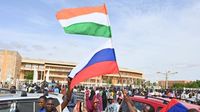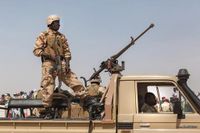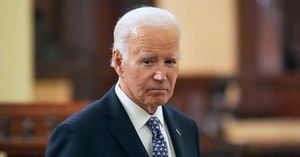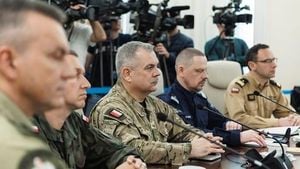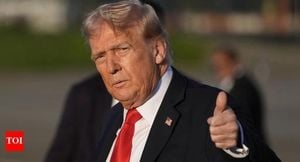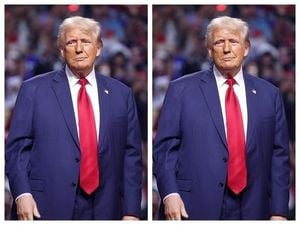On April 3, 2025, Russian Foreign Minister Sergei Lavrov announced that Russia is ready to assist in forming the united armed forces of the Alliance of Sahel States (ACS), which comprises Mali, Burkina Faso, and Niger. This declaration came during a meeting in Moscow with the foreign ministers of these three African nations, marking a significant step in Russia's engagement in the region.
Lavrov stated, "Russia today confirmed that it is ready, in addition to cooperation in strengthening the defense capabilities of the three countries through bilateral channels, to assist in the formation of the united armed forces of the Alliance of Sahel States." This assistance will include consulting services, specialized training courses, and the supply of military products, reflecting Russia's strategic interests in enhancing its influence in Africa.
The Russian minister emphasized that Russia already possesses experience in such cooperation, citing previous engagements with Belarus and the Collective Security Treaty Organization (CSTO) countries. He expressed confidence that the Sahel states would benefit from this collaboration, noting that Russian specialists are already present in significant numbers in Mali, Niger, and Burkina Faso.
Furthermore, Lavrov mentioned that Russia could aid these African nations in developing a scheme for equipping their armed forces with specific types of weapons and equipment. This initiative aligns with the broader goal of strengthening the military capabilities of the Sahel states, particularly in the face of ongoing security challenges such as terrorism and instability.
In July 2024, Burkina Faso, Mali, and Niger agreed to establish the Alliance of Sahel States, a decision that underscores their commitment to regional security and cooperation. This move followed their announcement in January 2024 to withdraw from the Economic Community of West African States (ECOWAS), a regional body they criticized for failing to support them in combating terrorism. Colonel Amadou Abdramane from Niger stated that ECOWAS is under Western influence and has not effectively assisted in their fight against terrorist threats.
Lavrov's remarks came amidst a backdrop of increasing military cooperation between Russia and these Sahel nations, particularly following military coups and the withdrawal of French troops from the region. Russian military personnel, including contractors and former members of the Wagner Group, have been deployed to these countries, becoming part of the newly formed African Corps under the Russian Ministry of Defense.
In a related context, Lavrov highlighted Ukraine's actions in Africa, accusing Kyiv of supporting terrorist groups in the region. He stated, "In addition to former colonizers, Kyiv has recently shown itself, openly supporting terrorist groups in this part of Africa with the full complicity of its Western sponsors." This statement reflects the geopolitical tensions surrounding Russia's activities in Africa and its rivalry with Western powers.
Notably, the situation in Mali has been particularly volatile. In July 2024, dozens of Wagner mercenaries were killed during an ambush by Tuaregs, an ethnic group in the Sahara. A source from the Russian BBC service, who previously served in the Wagner Group, reported that at least 82 mercenaries died in this incident, marking the largest losses for the group during its operations in Africa.
Following this ambush, Andrey Yusov, a representative of the Main Intelligence Directorate of the Ministry of Defense of Ukraine, confirmed Ukraine's involvement in the operation that led to the deaths of Russian mercenaries. He stated that Ukraine provided local rebel groups with essential information that facilitated a successful attack. In response, the governments of Mali and Niger severed diplomatic relations with Ukraine, accusing it of supporting terrorist factions.
As Lavrov prepares for further discussions with his counterparts from Mali, Burkina Faso, and Niger, the agenda is set to include a range of topics aimed at enhancing multifaceted relations between Russia and the Sahel states. Maria Zakharova, the official representative of the Russian Foreign Ministry, indicated that the meetings would focus on deepening political dialogue and strengthening sectoral cooperation.
Zakharova affirmed, "We confirm our commitment to effectively assist the alliance in establishing an independent political course and forming a new architecture of regional security based on its own strengths and the principle of 'African problems - African solutions.'" This statement underscores Russia's intent to position itself as a key partner for the Sahel states in their quest for stability and security.
In conclusion, the ongoing developments in the Sahel region highlight a significant shift in geopolitical dynamics, with Russia positioning itself as a crucial ally for Mali, Burkina Faso, and Niger. As these nations seek to enhance their military capabilities and assert their sovereignty, the implications of Russia's involvement will likely resonate across the region and beyond.

